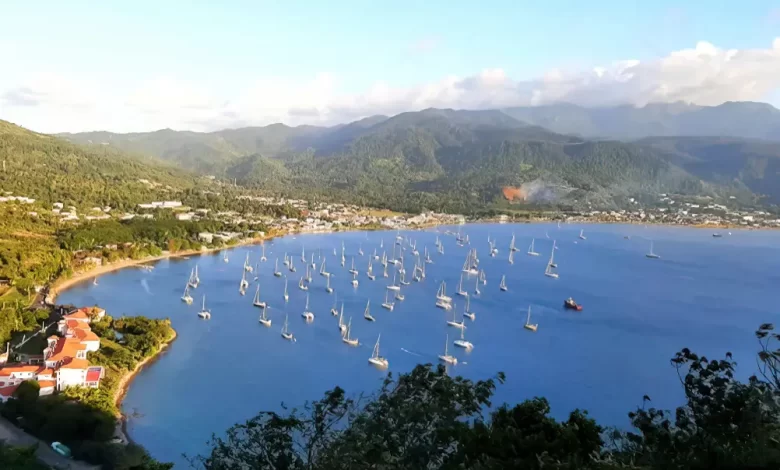Yachting in Dominica

Yachting in Dominica boasts a growing reputation for scenic coastlines, welcoming anchorages, and community-led initiatives that cater to international boaters. Lying between the French islands of Guadeloupe and Martinique, Dominica offers a more laid-back Caribbean escape, where volcanic landscapes, lush rainforests, and crystal-clear waters create a perfect yachting haven.
Dominica’s distinct character emerges from its protective coves and bays, friendly dockside culture, and focus on sustainable, community tourism. With an emphasis on environmental stewardship, local stakeholders, including the Portsmouth Association of Yacht Security (PAYS) and Dominica Yacht Services, collaborate to ensure that yachters experience the island’s natural beauty while supporting the protection of marine habitats and cultural heritage.
Over the past several years, Dominica has continued upgrading its nautical infrastructure, from mooring facilities to streamlined customs procedures, making it easier than ever for cruising yachts to dock and linger. Below, we explore the key attributes of the yachting scene, guiding boaters through prime anchorages, recommended marinas, and best practices to make the most of their stay.
Main Anchorages and Marinas
As you sail into Dominica, you’ll find a handful of natural harbors suited for yachting. Portsmouth, located on the northwest coast, is among the most popular stopovers. It accommodates many visiting yachts thanks to a reliable mooring system and proximity to marine services, grocery shops, and local restaurants. Here, yachters can also link up with the Portsmouth Association of Yacht Security (PAYS), recognized for its nightly security patrols and welcoming orientation. Another favored destination is Roseau, the island’s capital on the southwest coast, offering mooring balls, basic dockside amenities, and a central location for excursions into the island’s interior.
Portsmouth and Douglas Bay
In Portsmouth, the calm waters of Prince Rupert Bay, sometimes called Douglas Bay, give boaters a panoramic view of coastal mountains, a tranquil setting for early-morning swims, and easy dinghy access to local attractions. You can take a short stroll to discover centuries-old fortifications at Fort Shirley in Cabrits National Park or arrange a guided boat ride up the Indian River to encounter mangroves and wildlife such as herons and crabs. The presence of Dominica Yacht Services in the area ensures that yachters can source repairs, provisions, and advice for island exploration.
Roseau and Nearby Moorings
On Dominica’s western coast, Roseau provides moorings managed by local operators who assist with anchoring and docking, making it more straightforward for visitors to handle bureaucratic details like customs and immigration. Many yachters opt to stay in Roseau to take advantage of short drives to Trafalgar Falls, the natural hot springs at Wotten Waven, or to plan day hikes along sections of the Waitukubuli National Trail.
Access to Island Highlights
From Roseau, travelers can quickly access eco-tourism hotspots like the Boiling Lake—a testament to the island’s volcanic origins—and adventure-oriented tours such as canyoning or hiking. Dive shops near the city also connect boaters to marine sites like Champagne Reef or the Soufriere Scotts Head Marine Reserve. This synergy between yachting and broader tourism possibilities often encourages extended stays.
Environmental Stewardship
Operators in Roseau work hand-in-hand with local NGOs and government bodies to preserve nearshore reefs. Efforts include reef-cleanup events, community awareness programs, and volunteer opportunities in mangrove rehabilitation. This cooperative approach aligns with the island’s emerging reputation as a Sustainable Earth Inc. collaborative partner, emphasizing eco-friendly mooring systems and responsible waste disposal to protect coral reefs.
Customs, Immigration, and Other Practicalities
Dominica has streamlined its entry process for yachters. Upon arrival, boaters should report to customs and immigration at designated offices in Portsmouth or Roseau. Standard documents include a valid passport, crew list, and vessel registration. Fees are generally modest, reflecting Dominica’s desire to welcome cruising boats. Expect officials to be courteous, reflecting the island’s hospitable nature.
Provisioning and Repairs
Although Dominica’s supermarkets are smaller than those in neighboring islands, essential groceries, fresh produce from the local markets, and fisheries stocked with fresh catch are readily available. If you need boat repairs or maintenance, Dominica Yacht Services can coordinate with local mechanics or guide you to specialized shops. While in Roseau, look for hardware and marine supply stores that carry essentials like ropes, engine parts, and safety gear.
Mooring Fees and Fuel Stations
Mooring fees help fund improvements in public facilities, the maintenance of mooring balls, and local security patrols. Fuel stations at Portsmouth and Roseau cater to smaller vessels, offering diesel and gasoline. Some local businesses also sell lubricants and cooking gas.
Onshore Experiences and Cultural Events
Yachters have the option to explore a variety of cultural experiences onshore. Visitors can appreciate Dominica’s traditions beyond the shoreline by attending the lively weekend market in Roseau, enjoying local Creole cuisine, or dancing to Bouyon music. Festivals celebrating Carnival and Creole heritage in October often draw many visitors, making it a vibrant time for cruisers to witness the island’s cultural flair.
Ecotourism Integration
Local operators encourage boaters to engage in eco-tourism activities: hiking, birdwatching, and visits to geothermal sites. These ventures enrich the yachting experience by revealing Dominica’s diverse interior landscapes. Partnerships with community-based organizations encourage responsible tourism, reinforcing the synergy between land and sea explorations.
Opportunities for Volunteering
Some yachters stay longer to volunteer in reef cleanups, school events, or community outreach programs facilitated by local NGOs. These engagements create meaningful connections and offer a chance to give back to an island that provides serene anchorages and unforgettable adventures.




